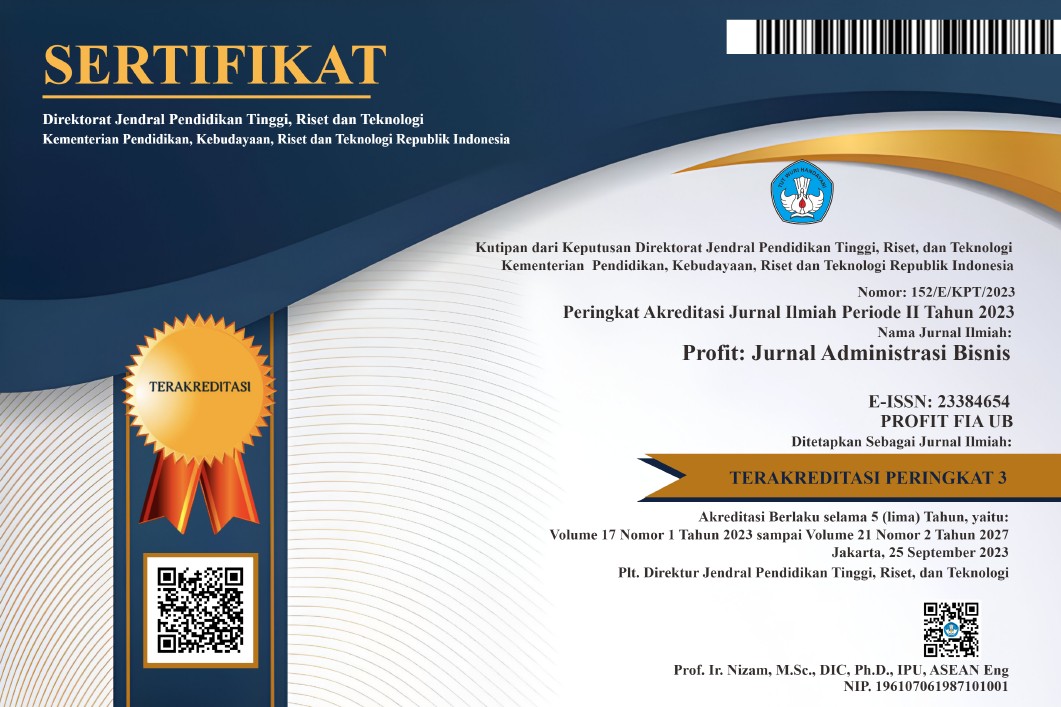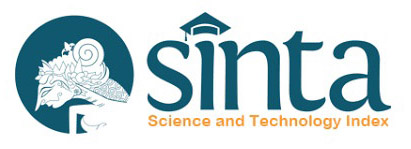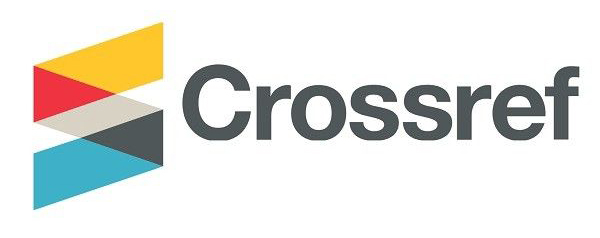PROSES PENYUSUNAN ANGGARAN UNTUK MEWUJUDKAN KINERJA DAN KEPUASAN KERJA BERBASIS PARTISIPASI DI UNIVERSITAS TEUKU UMAR
DOI:
https://doi.org/10.21776/ub.profit.2019.013.02.6Keywords:
Participatory Budget, perfοrmance, jοb satisfactiοn, and jοb mοtivationAbstract
Higher education prioritizes quality in achieving the vision and mission, achieving the vision and mission is strongly influenced by the strength of the budget owned by a college. The strength of the budget is not only seen from how much the existing budget is, but also how the wisest way to manage the budget. This research is motivated by the limited budget owned by a new state university in managing the budget in a participatory manner in achieving the university's vision and mission. For this reason, a participatory system is needed for the budgeting process, starting from the planning stage, the process, accountability and results that lead to the university's vision and mission. The study was conducted to obtain information on whether participatory budgeting has an influence on employee performance, whether participatory budgeting also has an impact on employee job satisfaction at Teuku Umar University, also seeing whether there is an effect of employee job satisfaction on employee performance. This study also wants to find out whether there is an influence of motivation on employee performance, the influence of participatory budget on employee performance through motivation, and whether employee job satisfaction affects employee performance through motivation.
References
Owushu, Eric Edwin. Dwomoh, Gabriel. Collins, Mintah. (2014). Assessing the Relationship between Budget Participation and Employees’ Performance of Public Universities in Ghana: a Case of University of Education. International Journal of Academic Research in Accounting Finance and Management Sciences (IJAR AFMS). Vol. 4 No. 1, hal: 85-95.
Hasniasari Rahmia, & Mahfud Sholihin. (2014). Analisis Hubungan Penganggaran Partisipatif dan Kinerja: Pengujian Efek Mediasi Keadilan Persepsian dan Komitmen pada Lembaga Hukum Sektor Publik di Indonesia. Jurnal Akuntansi dan Keuangan, Vol. 16 No. 1, hal: 23-32.
Kristianto, Dian. (2011). Pengaruh Kepuasan Kerja Terhadap Kinerja Karyawan dengan Komitmen Organisasi Sebagai Variabel Intervening.Jurnal Bisnis Strategi, Vol. 20, No. 2 hal: 165-175
Hameed, A., dan Waheed, A. (2011). Employee Development and its affect on employee Performance a Conceptual Framework. International of Business and Social Science. Vol. 13, No. 2, hal: 224-230
Affes, H., & Bouaziz, Z. (2012). “The Impact of the Strategy in Determining Transfer Prices: Case of the Tunisian Companies (electronic version)â€. Global Journal of Management and Business, 12(5) 11.
Osama, Mah’h. (2013). The Impact of Budgetary Participation on Mnagerial Performance: Evidence from Jordania University Executive. Journal of Applied Finance & Banking. Vol. 3, No. 3, hal: 133-156.
Safroni, Lazdzi. (2012). Manajemen dan Reformasi Pelayanan Publik. Yogyakarta: Aditya Media Publishing.
Hasibuan, Malayu SP. (2011). Manajemen Sumber Daya Manusia. Cetakan ke-15. Jakaarta: Bumi Aksara
Fariyana Kusumawati & M. Gus Salim. (2012). Hubungan Partisipasi Penyusunan Anggaran dengan Kinerja Pengelolaan Keuangan Daerah: Kepuasan Kerja dan Motivasi sebagai Variabel Pemoderasi. Infestasi. Vol. 8 No. 2, hal: 209-218.
Sinambela, Lijan Poltak. (2016). Manajemen Sumber Daya Manusia. Jakarta: Bumi Aksara
George, J. M., dan Jones, GR. (2006). Contemporary Management: Creating Value in Organization, 4st edition, 353. New York: McGraw Hill
Haryono, Siswoyo. (2017). Metode SEM untuk Penelitian Manajemen AMOS Lisrel PLS. Luxima Metro Media.
Henry, Nicholas. (2013). Public Administration and Public Affair, Pearson Education, Inc, United States,
Anwar Prabu Mngkunegara. (2009).â€Manajemen Sumber Daya Manusia.Bandung: PT. Remaja Rosdakrya
Handoko, T. Hani. (2010). Manajemen Personalia dan Sumber Daya Manusia, Edisi kedua. Yogyakarta: BPFE UGM
Wibowo Sulaiman. (2014). Analisis Regresi Menggunakan SPSS Contoh kasus dan Pemecahannya. Yogyakarta: Andi
Stella. (2013). “Pengaruh Partisipasi Penyusunan Anggaran Terhadap Kinerja Manajerial: Kepuasan Kerja dan Job Relevant Information sebagai Variabel Interveningâ€. Jurnal Bisnis dan Akuntansi, Vol. 15, No. 1, Juni, Hlm. 37-56.
Jimoh, A. M. (2008). “Emotional Labour, Conscientousness and Job Tenure as Predictors of Job Performance Among University Administrative Workers in Southwestern Nigerianâ€. International Journal of African & African Studies, Vol. VII, No. 2.
Davis, Keith & John Newstrom. (2004). Perilaku Dalam Organisasi. Ed. Ketujuh. Jakarta: Erlangga.
Hoque, Zahirul dan Peter Brosnan. (2007). Aligning Industrial Relations Risk, Budgetary Participation, and Budgeting Meaures of Performance: Impact on Managerial Performance. SSRN.
Mahmudi. (2005). Manajemen Kinerja Sektor Publik, Yogyakarta, UPP AMP YKPN.
Desiana, PM. Dan B.W. Soetjipto. (2006). “Pengaruh Role Stressor, Persepsi Dukungan Organisasi Terhadap Kepuasan Kerja dan Komitmen. Usahawanâ€, No.05 Th XXXV: 22-32
Sugiyono. (2010). Metode Penelitian Kuantitatif, Kualitatif dan R&D. Bandung: Alfabeta
Nengsy, Herda., Sari, Ria Nelly., Agusti, Restu. (2013). Pengaruh Partisipasi Penyusunan Anggaran Terhadap Kinerja Manajerial dengan Job Relevant Information, Kepuasan Kerja, dan Motivasi sebagai Variabel Intervenig. Jurnal Akuntansi. Vol. 2. No. 1, Oktober, Hal 1-17.
Greenberg, jerld dan Robert Baron. (2003). Behavior in Organizations (understanding and mnging the human side of work). Eight Edition: Prentice Hall
Winnetouw, Adiko. (2008). Pengaruh Kepuasan Terhadap Kinerja Karyawan Operasional Rothabama Event Organizer di Surabaya
Mardiasmo. (2006). Akuntansi Sektor Publik. Yogyakarta: ANDI
Downloads
Published
Issue
Section
License
The copyright of the received article shall be assigned to the journal as the publisher of the journal. The intended copyright includes the right to publish the article in various forms (including reprints). The journal maintains the publishing rights to the published articles.

This work is licensed under a
Creative Commons Attribution-NonCommercial 4.0 International License

















